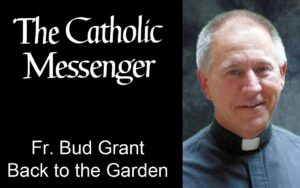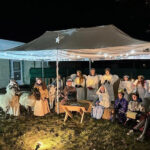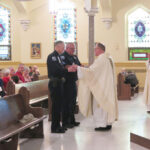By Father Bud Grant
About 20 years ago, I started telling my students that whatever career they chose for themselves they should consider adding an “eco-” prefix to it. My point was (and is) that the single most urgent and compelling set of issues facing the global community is ecological. Thus, the talents, energy and industry of our best-educated citizens must be ordered toward addressing that hydra-headed threat. This goes for priests, too. The most common response to homilies that reference Creation is “I’ve never heard a priest talk about that before.” That’s not good. In fact, we all might consider framing ourselves as “eco-Catholics.”
 Not long ago, Pope Francis warned Catholics that, unless the church made fundamental changes, it risks becoming a “museum.” Having made many study trips to Italy, I can confirm that tourists vastly outnumber pilgrims in the great basilicas of Rome, Florence and Milan. Only in Assisi could a case be made that the faithful still outnumber the recreational. The pope is right.
Not long ago, Pope Francis warned Catholics that, unless the church made fundamental changes, it risks becoming a “museum.” Having made many study trips to Italy, I can confirm that tourists vastly outnumber pilgrims in the great basilicas of Rome, Florence and Milan. Only in Assisi could a case be made that the faithful still outnumber the recreational. The pope is right.
More recently, the Holy Father issued an updated warning against “rigidity” that “arises from fear of change and ends up strewing the ground of the common good with stakes and obstacles, turning it into a minefield of lack of communication and hatred. Let’s remember always that behind every rigidity lies some derangement.”
Though subtle, I think the pope is saying that the church, at its best, is and has been and must be in a state of adaptation in response to the “signs of the times” (“Gaudium et Spes” 1). The alternative is to sink into irrelevancy. The pope practices what he preaches. In response to global ecological crises, he has been ringing the alarm bell since stepping onto the balcony of St. Peter’s Basilica and introducing himself as “Francis.”
Last month the BBC re-published an online article titled “Tomorrow’s Gods: What is the Future of Religion?” The author notes the decline in the West of religiously affiliated people. In the USA, the largest segment of the population consists of “apathists” who simply find religion irrelevant.
Paradoxically, “green” spiritualism is on the rise. Neo-druidism makes the news every solstice with the requisite backdrop of Stonehenge. Ásatrú and Rodnovery are similar neo-pagan movements. It all feels a bit superficially squishy, but the common denominator is a sort of new-age concern for the earth. In fact, one new religion is called “Witnesses of Climatology.” Its founder, Olya Irzak, created it because, she says, technical solutions are not nearly as compelling as “a multi-generational social construct that organizes people around shared morals.”
Which brings us to the moment. The most urgent moral crisis of history is upon us. Religion, interestingly, is distinctly well designed to address it. First, it builds community. Secondly, it emphasizes such universal moral norms as the common good. Third, it taps into a deeply held human desire for tradition, ritual and transcendence. Christianity contributes the shocking insistence on the Incarnation and Catholicism sacramentalizes all that in the Eucharist … an otherwise insignificant wafer of wheat that we dare say is Christ’s presence among us. Yet the church is drifting into irrelevancy just as the signs of the times are increasingly ominous.
What does the future hold for religion, then? Well, at the very least, Christ will always remain among us — as he promised. Catholicism, while distinctly versatile in engaging in self-destructive behaviors, has also proven to be resiliently re-creative. St. Francis led a generation of reformers. He was not the first. Pope Francis is just the most recent. If we unshackle ourselves from “deranged rigidity” while reinvesting in the rich deposit of our faith tradition — especially through an invigorated theology of Creation — then we could be on the cusp of a religious renaissance. We specialize, after all, in “Gaudium et Spes,” (Joy and Hope).
Here’s to a New Year’s resolution. Reformation? Revolution?
(Father Bud Grant is a professor of theology at St. Ambrose University in Davenport.)











